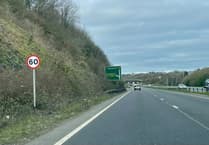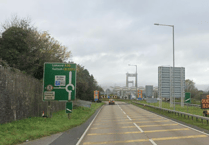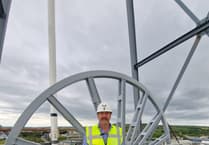CORNWALL Councillors have voted through a budget for the Tamar Bridge and Torpoint Ferry that will see the committee pursue a path of toll rises linked to inflation.
An impassioned case was put by Looe councillor Armand Toms for Cornwall to benefit from the same sort of central support as other bridges and ferries in devolved parts of the UK. But his amendment – calling for the leader of the Council and cabinet to write to the government and MPs asking for ‘true levelling up’ of this sort, was voted down.
Cabinet member for Transport Connor Donnithorne and co-chair of the joint Bridge and Ferry committee Martin Worth spoke of the grave financial situation that would almost inevitably lead to toll hikes – but insisted that no option would be left unexplored when seeking future solutions.
Cllr Donnithorne set the context in which he wanted councillors to understand the crossings budget: when these plans were drawn up, he said, the committee could have had no way of knowing of the economic conditions to come, including unprecedented inflation, that would affect both the income and expenditure of the joint undertaking. He cited electricity bills for the Bridge, which for 2022-23 were £123,000 and for the coming financial year were estimated at £400,000.
Cllr Worth set out three basic choices – either the user pays, the local authorities pay, or the government pays. He left councillors with the startling image of National Highways officers “being taken 100 feet above the bridge with hard hats so that they could understand our issues, something which has never happened before”.
The scene was set that with reserves set to run out at the end of next year, Cornwall Council and Plymouth City Council will end up having to pay deficits.
The Cabinet member was asked how the aims of Cornwall’s climate emergency plans – including reduction in car usage by 30% - were being balanced against the rising costs of the crossings.
Callington’s Councillor Andrew Long felt that Westminster “wasn’t listening or taking action” and that “true devolution” was the reason for bridges in Scotland and Wales being free to use.
Lostwithiel’s Colin Martin asked why Cornwall couldn’t have asked for a proportion of the £5bn national Strategic Road Network Fund, as this would result in the county having enough cash to pay for the crossings with plenty left over for other projects.
Cllr Donnithorne said he was a passionate supporter of a Cornish Parliament but that he saw the current devolution deal as a first important step. He said that the positive relationships were being built between Cornwall’s leaders and the Department for Transport, as proven by conversations with the Minister Richard Holden during his recent visit to Cornwall, and Cllr Worth added that this was the way to go, rather than letter writing and “going to government with a begging bowl”.
The issue of how to sustain the crossings is one which has faced the two local authorities for decades. The presence of the Dockyard, the fact that since 1984 the bridge has effectively carried a 300m stretch of strategic national road, the Act of Parliament which has bound the two authorities into a unique set of constraints since 1957, and the conjoining of the ferry and bridge as one operation are all factors affecting the politics around the long-term decisions to be made. There has never been a consensus, but as the cost of living brings huge pressure to both local commuters and the councils themselves, the most immediate financial problems are the ones the committee looks first to address.
An important new aspect to the picture is the work being done by the Tamar Toll Action Group on their campaign to see tolls abolished, and to monitor and report the discussions and decision-making of the bridge and ferry committee. Their persistent and cohesive efforts to keep the pressure on local politicians, keeping things in the public eye, have led them to make some big strides in the nine months since they launched. The action group committee reports that had a constructive meeting with Plymouth MP Luke Pollard this weekend just gone, and that they are due to meet with SE Cornwall MP Sheryll Murray on Sunday (March 5).
After the budget and its context was introduced, councillors had the chance to state viewpoints and ask questions, which were then addressed by Cllrs Donnithorne and Worth, before a vote — which passed the budget — was taken.
Cllr Nick Craker (Liskeard)
“The financial information doesn’t look particularly rosy to me – it shows the finances going into deficit by 2024. Where is that money going to come from? I am not seeing factored into the plans that this money will have to come from Cornwall Council and Plymouth City Council’s own budgets. I worry that we know what the options are – it’s either put the tolls up or we have to pay. The government may or may not come forward with some revenue funding, it would be great if they do, I think that they should, but time is running out”
Cllr Donnithorne explained, that under the Tamar Bridge Act and the user pays prinicple we have a limited number of income-generating tools to us, and one of those is to put up the tolls. If we don’t take decisive action, it will leave this Council with a £1m bill, because we have to take 50% of the hit of any deficit that is run up.
Cllr Armand Toms (Looe and Deviock)
Cllr Toms has argued the case that the crossings should be centrally subsidised for more than a decade. He brought to the attention of the meeting various projects through time where the Government and Cornwall Council have invested in infrastructure in other parts of the county, citing the Isles of Scilly Ferry and the Mid-Cornwall Metro as two recent examples – but said that there had historically been “very little or nothing in it” for SE Cornwall.
“It seems there is a pattern here, that people in my area, who have to go to Plymouth to work, to get the decent wages and to access health services, are being penalised for wanting a better life. It’s vital to our economy and our workforce, but that Bridge is a barrier to economic growth.”
“£27m was given in levelling up funding to the Skye Ferrry, £49m for the IoS Ferry. We’ve got three ferries that go across the Tamar – nothing. The Woolwich Ferry and 29 bridges in the London area are free. In Cornwall we pay.”
Cllr Toms proposed an amendment to the motion before council, that: “The leader of the Council write to local MPs and relevant ministers asking for a true levelling up. If bridges in Wales and Scotland are centrally funded, and ferries in Scotland are supported, why can’t the same be done in Cornwall?”
Cllr Toms’ amendment was voted down by 41 to 36 with 2 abstentions.
Cllr Donnithorne’s response on the other infrastructure projects in Cornwall was that you cannot compare them to the crossings because “none of those are bound by the Tamar Bridge Act”.
On the suggestion that the leader write to Government: “The joint committee is the right body to approach MPs and government over funding and they (the committee) have a plan of action. The Devolution Deal opens up further opportunities for negotations with government on the Tamar Crossings and this has been confirmed by the recent meeting with Transport Minister Richard Holden.”
Cllr Hilary Frank (Saltash)
Cllr Frank drew attention to the forecast figures for toll income: The 2022-23 income from tolls was £14.4m, the estimated income from tolls for 2023-24 would be £16m. If traffic levels were forecast to stay at 90% of pre-pandemic levels as described in the budget, she asked, then how would this rise in income of around 11.4% be achieved?
Cllr Worth: “The reason (for the discrepancy) is with the current increases in toll price, we won’t have enjoyed a full year’s revenue. When we move into next year, we will get a full 12 months of that revenue, therefore it will be larger. It’s a phasing issue – we’re not exactly following the calendar year with when the increases took effect, because this was split between our Tag and cash.
Cllr Andrew Long (Callington and St Dominic)
“The real reason Wales and Scotland have free bridges is because these places have true devolution, not the sort of deal proposed by Cornwall Council.
I’ve been banging on about how the user pays principle for the crossings is flawed since 2009. The user pays principle is not right in this situation, because in SE Cornwall people have no choice but to use the bridge and ferry. The user pays principle works where there is an alternative choice.
“The only ones that aren’t paying are central government, who put their road on top of our bridge and don’t pay a penny. We need to make a stand.
“Our committee and officers are working really hard and I praise our cabinet members who are talking to Ministers, but it seems there is very little listening going on in Westminster.”
Cllr Donnithorne responded: “I’ve always been a passionate supporter of a Cornish Parliament or Assembly, but I would see this (the deal) as the starting point of significant Devolution.”
Cllr John Conway (Launceston)
Cllr Conway put forward the view that the current situation, whereby the ferry takes up a much higher proportion of the costs of the operation and brings in a much lower proportion of the income, was not sustainable.
Cllr Donithorne declined to get into discussion on this point as this topic was not part of the budget documents being considered.
Cllr Adrian Parsons (Altarnun and Stoke Climsland)
Cllr Parsons accused the cabinet of being out of touch with people on the ground.
“This isn’t just an issue that affects SE Cornwall, it also affects North Cornwall. What you’re effectively doing by putting the prices up is forcing people in my division to go through St Ann’s Chapel and via Tavistock to enter Plymouth. This has an environmental impact and an impact on the people who use these roads. If prices on the bridge continue to go up, you can be sure that usage will go down.
Cllr Donnithorne said: “We’re completely in touch with the difficult decisions in front of us….I suppose that’s the difference between being in opposition and being in the administration.”
Cllr Colin Martin (Lostwithiel and Lanreath)
“In Cornwall’s long-term transport straetgy we see a reduction in car use of 30% - yet this doesn’t seem to be reflected in the number of people forecast to use the bridge. If the number of users does decline significantly, that’s going to make it even more expensive for those who remain.
“The bridge is part of the Strategic Road Network (SRN). The Govt is spending £5bn per year on upgrades to the SRN. Has anybody in cabinet asked, as part of the Devolution deal, for us in Cornwall to get our 1% slice of that funding? That would be £50m per year, which would be enough to pay for the bridge and ferry – we as a devolved authority would have the power to say that the ferry is part of OUR strategic network – and we’d still have £35m left over to spend on upgrades to the A30 and the A38. At the moment, while relying on central govt funding, it looks like we’ll be waiting until 2027 to get some traffic lights at Landrake.”
On the reduction of car use, Cllr Donnithorne said that it was incredibly difficult to model in accurate figures of people’s potential shift to use of bus or train.
On the Strategic Road Network funding, the cabinet member responded that he was not in post when the Devolution Deal was put together.
Cllr Martin says he asked the same question at a public meeting and that the answer was that the Council “hadn’t asked” for the SRN funding to be part of the Devolution deal.





Comments
This article has no comments yet. Be the first to leave a comment.